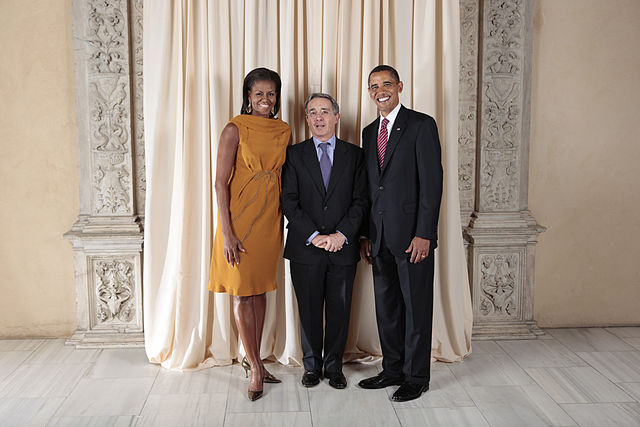Canada’s spanish language newspaper Correo Canadiense published an interview with me on Hector Mondragon a couple of days ago. It was conducted in Spanish and it is published in Spanish but I wanted to include it here for completeness, as things can disappear on the web sometimes… so I am including it in its entirety below, as well as the link. It was a faithful interview. The journalist, Elizabeth Meneses, was quite thorough in her questions and the answers are very close to what I remember saying (and thinking). Given the nature of the topic and the importance of precision, this is very much to her and Correo Canadiense’s credit.
In any case Hector has written his own words, and they will appear here and elsewhere as soon as we can get them in english.
-J.
“Los movimientos sociales no somos terroristas”, Justin Podur
En Colombia investigan conexión Canadá con las FARC
Por ELIZABETH MENESES
Posted: 2008-09-05
Main Photo
El ex jefe guerrillero Raúl Reyes. EFE
El escritor y activista de Pueblos en Camino en Canadá, Justin Podur conoce a Héctor Mondragón, el hombre que la semana pasada apareció en un informe del periódico El Tiempo, como alguien conocido del ex líder guerrillero colombiano Raúl Reyes.
“Héctor es una de las voces mas creíbles y sólidas que piden por el cambio y una salida negociada del conflicto en Colombia. El es una persona que tiene un perfil hecho en Canadá y en Europa”, dice Podur en entrevista con CORREO Canadiense.
Podur sale en defensa de Mondragón, después que el reporte de la publicación colombiana le involucrara con Liliana Obando Villota, alias ‘Sara’, quien fue capturada el pasado 8 de agosto y acusada de recaudar fondos a nivel internacional para la organización terrorista FARC.
La detención de ‘Sara’ se hizo posible a labores de rastreo entre Canadá y Colombia.
Según agentes de inteligencia citados por el diario colombiano, ‘Sara’ tendría sobre sus hombres la responsabilidad de coordinar las células de esa agrupación en Canadá.
“Y en un correo del 2 de abril del 2006, ‘Reyes’ le escribe a un hombre identificado como Héctor Mondragón: “Quiero presentarle a la camarada Liliana (….) ella trabaja conmigo y al mismo tiempo presta accesoria a Fensuagro (Federación Nacional Sindical Unitaria Agropecuaria) en su trabajo de relaciones internacionales. Naturalmente se trata de una camarada de absoluta confianza”, cita El Tiempo, sobre el texto de uno
de los correos enviados por Reyes, quien fuera dado de baja en un operativo del ejército colombiano el pasado mes de marzo.
“No creo en esta historia del portátil de Raúl Reyes porque hay un informe de Interpol que dice que después de 48 horas que tuvieron el laptop, hubo cambios a miles de archivos. No podemos tener confianza en eso”, dice Podur, quien cree que se trata de un montaje.
Héctor niega vínculos
En un correo electrónico enviado a sus amigos mas cercanos, Héctor niega cualquier vínculo con el grupo guerrillero Farc.
“Hoy se lanza contra mi algo que nunca existió”, dijo Héctor en el email que también llego a Podur.
“Conozco a Héctor personalmente y políticamente. Personalmente él nos ha dicho que el supuesto correo de Reyes nunca existió. Es su palabra y yo creo en él”.
Agrega Podur que “políticamente, él es un pacifista, el ejemplo de alguien que practica la no violencia y la lucha del cambio social a un costo personal increíble; se trata de una persona que esta viviendo en la clandestinidad y ha perdido mucho de su vida familiar”, asegura Podur.
En su descripción acerca de Mondragón, Podur menciona que Héctor ha sido un activista desde su época universitaria, que ha ensenado cursos en universidades estadounidenses y que fue galardonado con una beca por su trabajo en derechos populares por parte de Human Rights Watch.
Economista de profesión, Héctor Mondragón habría estado en Canadá en el año 2000, a través de un evento organizado por el grupo Solidaridad Colombia.
“Yo no lo conocí en esa oportunidad sino un año después cuando fui con Acción permanente por la paz, con un grupo de pacifistas que tuvimos la oportunidad de reunirnos con él y Héctor nos dio su análisis de la coyuntura política colombiana como economista y líder de los movimientos indígenas”, dice.
Justin Podur y Héctor Mondragón mantienen contacto vía email y la ultima vez que se vieron fue en el 2004, cuando el escritor canadiense estuvo en el departamento del Cauca, Colombia.
Para Justin, Mondragón es un objetivo del gobierno colombiano porque éste “ha tomado acciones contra movimientos populares y sociales y Héctor es un ejemplo de esto y por eso es un objetivo”.
–Usted que conoce a Héctor, puede decirnos ¿cual es la posición de él frente a las Farc?
El está muy cerca de los movimientos indígenas del norte del Cauca y estos grupos reclaman autonomía frente a todos los actores armados, eso significa un no al estado, los grupos paramilitares y a las Farc. Puede que esa guerrilla haya tenido o todavía tenga ideales pero ellos no están de acuerdo con las estrategias y violaciones de derechos humanos que las Farc ha hecho.
–¿Conoció o escuchó de Liliana Obando Villota, o Sara?
-Nunca he escuchado de ella ni por reputación su nombre, sólo cuando lo leí en el artículo de El Tiempo. No conozco a todos los que estaban trabajando con solidaridad.
Todos los movimientos armados tienen conexiones internacionales, pero también los movimientos pacíficos y sociales que nunca levantaron armas y que están opuestos a los paramilitares tienen conexiones y no necesariamente son miembros o grupos que apoyan a las Farc. Ellos no quieren estar en un lado o el otro. Y este montaje que están haciendo va en contra de todos los procesos sociales.
— Para usted, ¿quien es Héctor Mondragón?
El es mi héroe en el sentido de que si yo pudiera ser como él, sería un honor. Me gustaría tener su claridad analítica, moral y valor en todos los sentidos.
emeneses@elcorreo.ca

